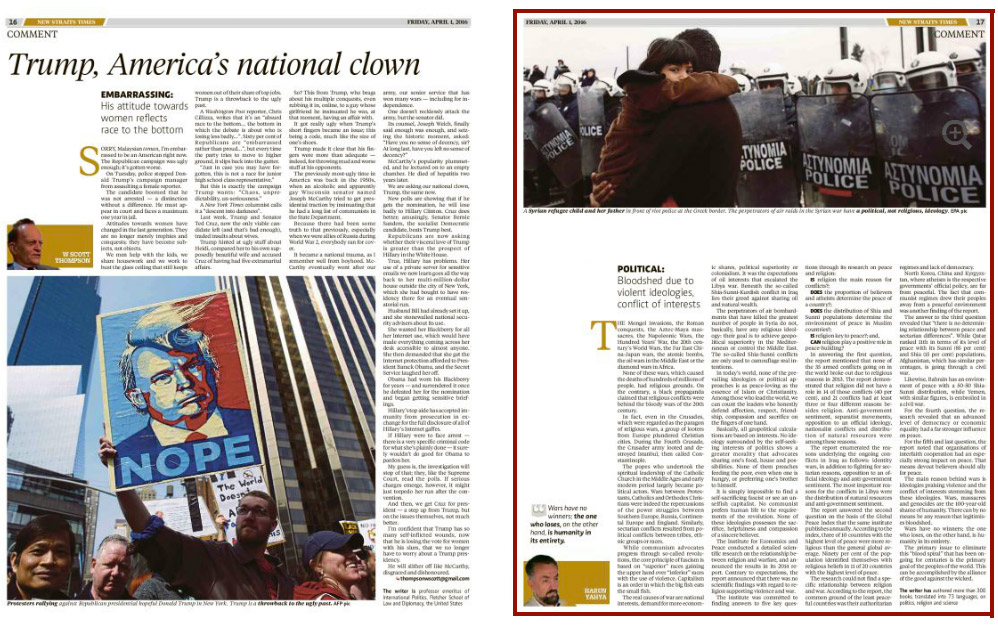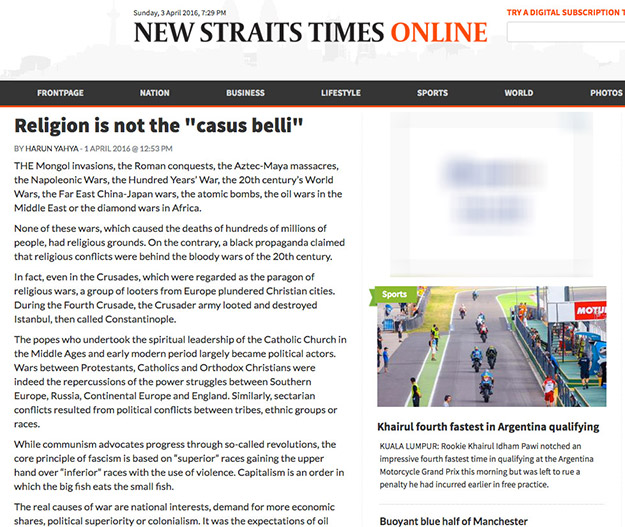
The Mongol invasions, the Roman conquests, the Aztec-Maya massacres, the Napoleonic Wars, the Hundred Years’ War, the 20th century's World Wars, the Far East China-Japan wars, the atomic bombs, oil wars in the Middle East or diamond wars in Africa.
None of these wars, which caused the death of hundreds of millions of people, had religious grounds. On the contrary, a black propaganda that claimed religious conflicts were behind the bloody wars of the 20th Century was carried out. In fact, even in the Crusades, which were regarded as the paragon of religious wars, a group of looters coming from Europe plundered Christian cities. During the Fourth Crusade, the Crusader army looted and destroyed Istanbul, which was then called Constantinople. The popes who undertook the spiritual leadership of the Catholic Church in the Middle Ages and the early modern period, largely became political actors. Wars between Protestants, Catholics and Orthodox Christians were indeed the repercussions of the power struggles between Southern Europe, Russia, Continental Europe and England. Similarly, sectarian conflicts resulted from political conflicts between the tribes, ethnic groups or races.
While communism advocates progress through so-called revolutions, the core principle of fascism is based on "superior" races gaining the upper hand on the "inferior races' with the use of violence. Capitalism is an order in which big fish eats small fish. The real causes of war are national interests, demand for more economic shares, political superiority or colonialism. It was the expectations of oil interests that escalated the Libya war. Beneath the so-called Shia-Sunni-Kurdish conflict in Iraq lies their greed for sharing oil and natural wealth. The perpetrators of air bombardments that have thus far killed the greatest number of people in Syria do not basically have any religious ideology: Their goal is to achieve geopolitical superiority in the Mediterranean or to control the Middle East. The so-called Shia-Sunni conflicts are only used to camouflage real intentions.
In today’s world, none of the prevailing ideologies or political approaches are as peace-loving as the essence of Islam or Christianity. Among those who lead the world, we can count the leaders who honestly defend affection, respect, friendship, compassion and sacrifice on the fingers of one hand. Basically all geopolitical calculations are based on interests. No ideology surrounded by the self-seeking interests of politics shows a greater morality that advocates sharing one's food, house and possibilities. None of them preach feeding the poor even when one is hungry or preferring one's brother to himself. It is simply impossible to find a self-sacrificing fascist or to see an unselfish capitalist. No communist prefers human life to the requirements of the revolution. None of these ideologies possesses the sacrifice, helpfulness and compassion of a sincere believer.
The Institute for Economics and Peace conducted a detailed scientific research about the relationship between religion and warfare and announced the results in their 2014 reports. Contrary to expectations, the report announced that there is no scientific finding with regard to religion supporting violence and war. The Institute was committed to find the answers to five key questions through its research on peace and religion:
- Is religion the main reason for conflicts?
- Does the proportion of believers and atheists determine the peace of a country?
- Does the distribution of Shiite and Sunnite population determine the peace environment in Muslim countries?
- Is religion key to peace?
- Can religion play a positive role in peace building?
While answering the first question, the report mentions that none of the 35 armed conflicts currently going on in the world broke out due to religious reasons in 2013. The reports demonstrated that religion did not have any role in 14 of those conflicts (40%) and 21 conflicts had at least three or four different reasons besides religion. Anti-government sentiment, separatist movements, opposition to an official ideology, nationalist conflicts and the distribution of natural resources are among these reasons. The report enumerates the reasons underlying the ongoing conflicts in Iraq as follows: Identity wars in addition to fighting for sectarian reasons , conflict against an official ideology and anti-government sentiment. Furthermore, the most important reasons for the ongoing conflicts in Libya are the distribution of natural resources and anti-government sentiment.
The report answers the second question on the basis of the Global Peace Index that the same institute annually publishes. According to this index, three out of ten countries with the highest level of peace are more religious countries than the general global average. 90% of the population identifies themselves with religious beliefs in 11 out of 20 countries with the highest peace level. The research could not find a specific relationship between religion and war. According to the report, the common ground of the least peaceful countries is their authoritarian regimes and their lack of democracy. North Korea, China or Kirgizstan, where atheism is the official policy of their respective governments, are far from being peaceful. The fact that communist regimes draw their people away from a peaceful environment is another finding of the report.
The answer to the third question reveals that “there is no determining relationship between peace and sectarian differences.” While Qatar ranks 11th in terms of levels of peace with its Sunni (85%) and Shiite (15%) population, Afghanistan, which has similar percentages, is going through a civil war. Likewise, Bahrein has a peace environment with a 50%-50% Shiite-Sunni population distribution while Yemen, with similar figures, is embroiled in a civil war.
For the fourth question, the research of the institute reveals that advanced level of democracy or economic equality has a far stronger influence on peace.
For the fifth and last question that defined the report, the report notes that organizations of interfaith cooperation have an especially strengthening impact on peace. That means, devout believers should ally for peace.
The main reason of wars is ideologies praising violence and the conflict of interests that stem from these ideologies. Wars, massacres, genocides are the hundred-years-old shame of the humanity. There can be by no means any reason that will legitimize bloodshed. Wars have no winners; the one who loses, on the other hand, is the entire humanity. The primary issue to eliminate this blood spiral ongoing for centuries is the primary goal of the peoples of the world. This, on the other hand, can be accomplished by the alliance of the good against the wicked.
Adnan Oktar's piece in New Straits Times:
http://www.nst.com.my/news/2016/04/136587/religion-made-scapegoat-wars



